Dentsu Conducts LGBTQ+ Survey 2023
Oct 19, 2023
- Sustainability
- Research Report
― Releases digital book “Things I've Always Wanted to Ask You” visualizing awareness of LGBTQ+ matters ―
Dentsu (brand: dentsu; Head Office: Dentsu Group Inc.; Location: Tokyo; Representative: President & CEO Hiroshi Igarashi; hereinafter referred to as “the Company”) announced today that in June 2023, the dJ Sustainability Office, an organization within dentsu Japan, the entity that oversees business in Japan, conducted an online survey of sexual and gender minorities, including members of the LGBT (Lesbian, Gay, Bisexual, and Transgender) community. The nationwide survey covered 57,500 people between the ages of 20 and 59.
In order to contribute to the creation of a society where everyone can thrive, regardless of gender identity or sexual orientation, Dentsu Inc., a subsidiary of Dentsu Group Inc., conducted four surveys in 2012, 2015, 2018, and 2020, respectively, with the aim of understanding the current situation and identifying issues surrounding LGBTQ+ people. The fifth and latest survey, “LGBTQ+ Survey 2023,” was conducted under the leadership of the Company. A detailed analysis was performed on the awareness, knowledge, and behavior of not only LGBTQ+ people*1 (lesbian (L), gay (G), bisexual (B), transgender (T), queer or questioning (Q) and other diverse genders and sexualities (+)) but also non-LGBTQ+ people who identify as heterosexual and whose gender identity matches the sex assigned at birth (cisgender).
In addition, a digital book based on the survey results called “Things I've Always Wanted to Ask You,” intended to serve as a starting point for dialogue in the daily lives of both LGBTQ+ and non-LGBTQ+ people, was published. The book’s aim is to inspire dialogue between the two groups and help create a society where LGBTQ+ people can live their lives securely and comfortably by visualizing the awareness of each group through data, based on the four themes of “Coming Out,” “Communication,” “Daily Life,” and “Love.”
You can download the digital book “Things I've Always Wanted to Ask You” from the URL below (available in Japanese only).
URL:
https://www.d-sol.jp/ebook/lgbtqplus-research-2023-things-i-have-always-wanted-to-ask-you
*1 In the “LGBTQ+ Survey 2023,” sexuality was classified according to a combination of three categories, namely “gender identity,” “sex assigned at birth,” and “sexual orientation (the gender one is romantically or sexually attracted to).” Based on the responses given at the time of the survey, respondents who identified themselves as “not heterosexual” and their gender identity as “not cisgender” are defined as “LGBTQ+ people.”
Key topics
1. Release of the digital book “Things I've Always Wanted to Ask You” that visualizes awareness of LGBTQ+ matters (available in Japanese only)
2. The percentage of LGBTQ+ people is 9.7%. Continuing on from the previous survey, the latest survey also covered diverse genders and sexualities other than LGBT
3. Although awareness of LGBTQ+ inclusion is high at approximately 80%, there is a gap between the rate of awareness and behavior, as less than 20% use gender-neutral language
4. Around 60% of respondents said they would like to work for companies with initiatives related to LGBTQ+ issues, and this percentage is high among non-LGBTQ+ people as well
5. Approximately 70% of parents of LGBTQ+ children said they want to support their child’s life to the fullest, while approximately 60% agreed that “It is difficult for families with sexual minorities to live in the area where I live.”
6. Respondents living in municipalities with a partnership system agreed that the area where they live is a comfortable place to live. However, approximately 70% said they were not aware of the system even if it existed
7. There are differences in how people seek out information depending on their attitudes towards support for LGBTQ+ people
Detailed results for each topic
1. Announcement of the digital book “Things I've Always Wanted to Ask You” that visualizes awareness of LGBTQ+ matters (available in Japanese only)
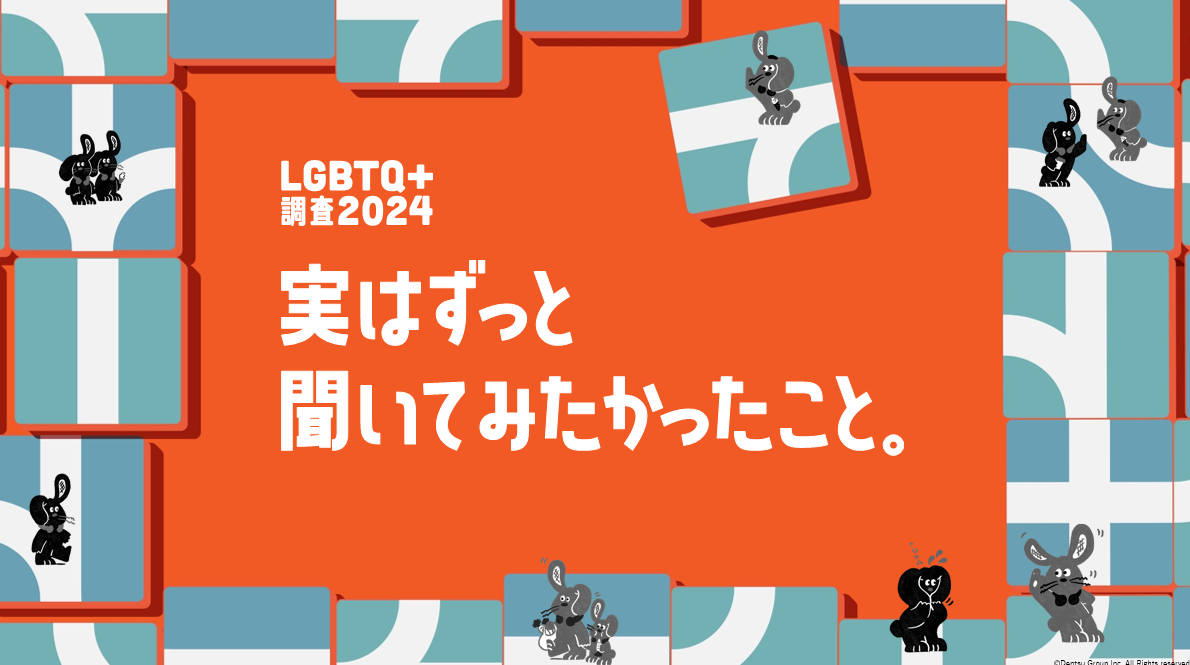
The digital book “Things I've Always Wanted to Ask You” based on the survey results was released in a free-to-download format. The book’s aim is to inspire dialogue between LGBTQ+ and non-LGBTQ+ people and help create a society where LGBTQ+ people can live their lives securely and comfortably by visualizing the awareness of each group through data, based on the four themes of “Coming Out,” “Communication,” “Daily Life,” and “Love.”
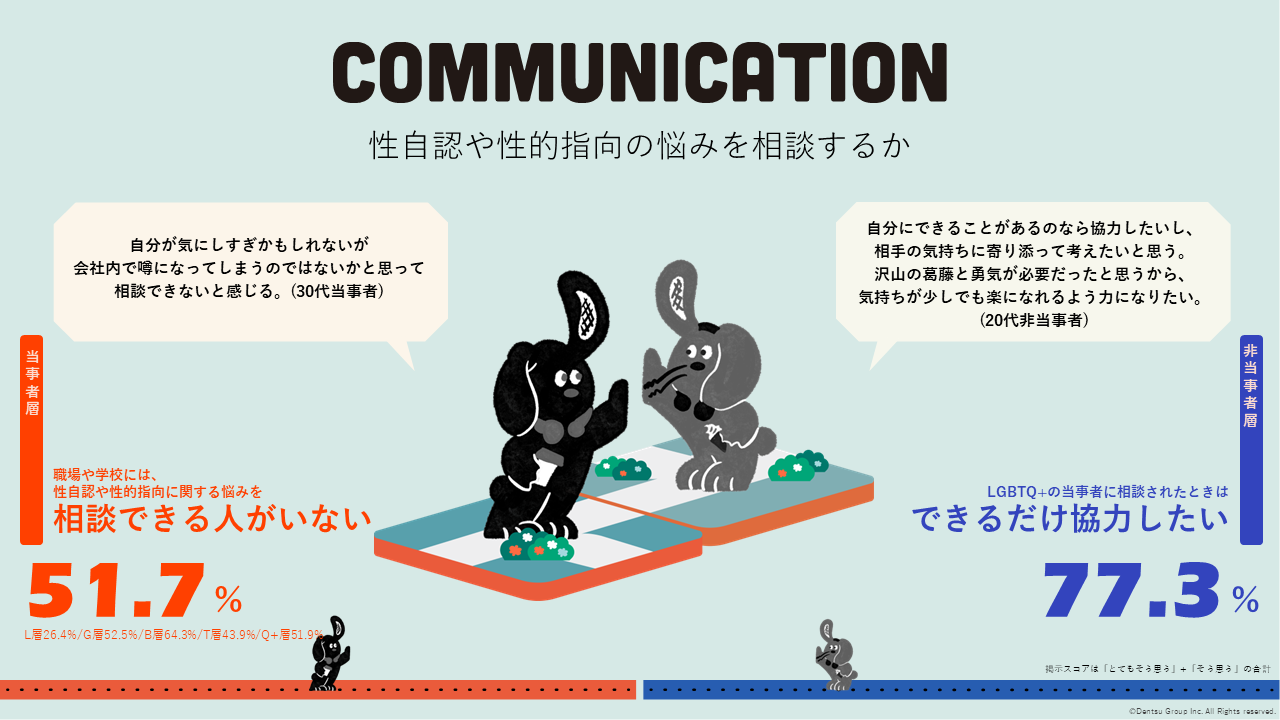
The image shown is an excerpt from the digital book, created with the motif of big-eared rabbit characters listening to each other’s voices. In addition to the results of the “LGBTQ+ Survey 2023,” responses from both LGBTQ+ people and non-LGBTQ+ people obtained from additional qualitative surveys are introduced.
2. The percentage of LGBTQ+ people is 9.7%. Continuing from the previous survey, the latest survey also covered diverse genders and sexualities other than LGBT
In the “LGBTQ+ Survey 2023,” sexuality was classified according to a combination of three categories, namely “gender identity,” “sex assigned at birth,” and “sexual orientation (the gender one is romantically or sexually attracted to).” Based on the responses given at the time of the survey, respondents who identified themselves as “not heterosexual” and their gender identity as “not cisgender” are defined as “LGBTQ+ people.” As a result, the percentage of LGBTQ+ people among all respondents to the pre-screening survey of 57,500 people was 9.7%, a slight increase from the 8.9% in the 2020 survey. It is speculated that one of the reasons for the increase is that people have become more aware of their own gender identity and sexual orientation due to the increase in information about LGBTQ+ people. However, in light of the fact that some respondents find it difficult to express their gender identity or sexual orientation even in anonymous surveys, and that perceptions of gender and sexuality are fluid among individuals, we will continue to monitor score trends.
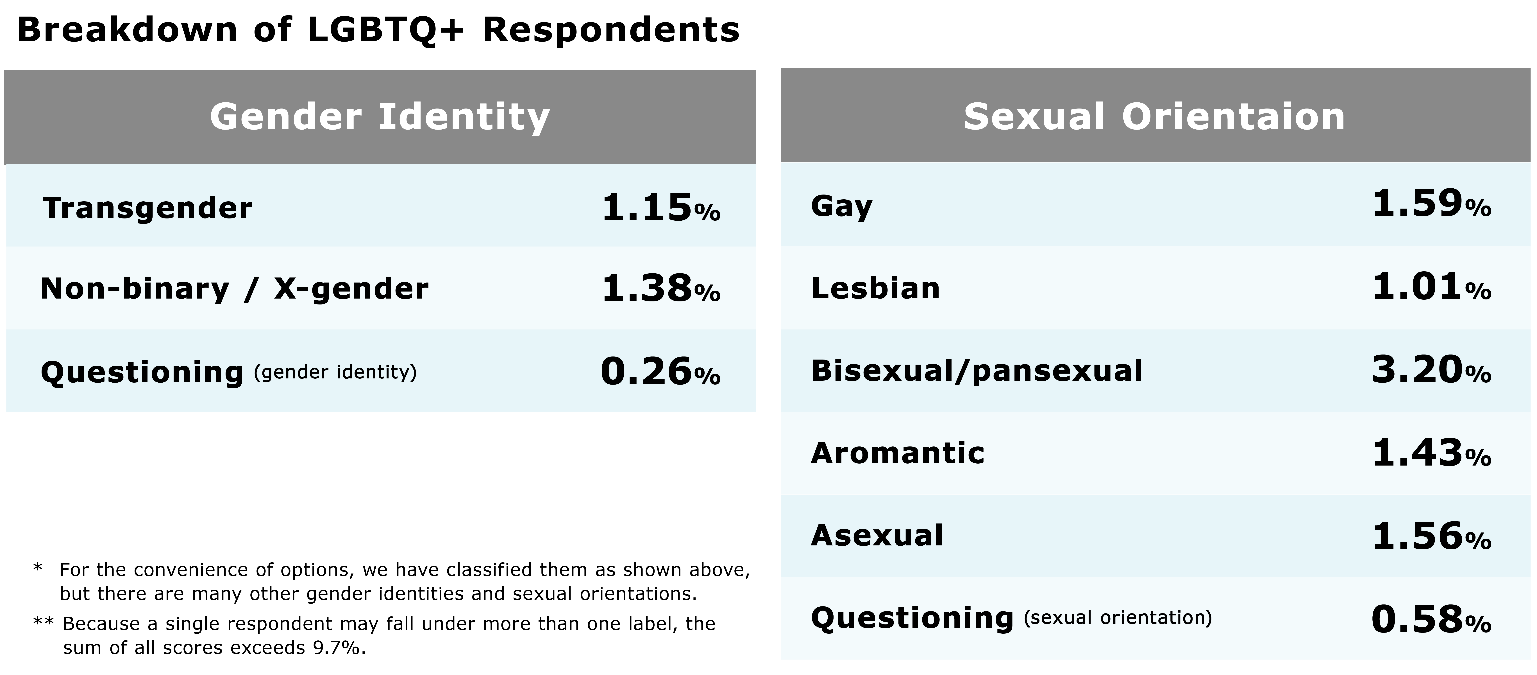
In addition, the breakdown of the categories according to the combinations of “gender identity and sex assigned at birth” and “gender identity and sexual orientation” is as shown above. It has been confirmed that there are various genders and sexualities other than L, G, B, and T. 1.38% are “Non-binary/X-gender (gender identity may change between male and female and is not fixed, they feel like they are both male and female, and feel neither male nor female),” 0.26% “question their gender identity (not knowing whether they are male or female),” 1.43% are “aromantic (not romantically attracted to others, regardless of gender),” 1.56% are “asexual (not sexually attracted to others, regardless of gender)” and 0.58% “question their sexual orientation (not knowing the gender of the person they are romantically or sexually attracted to).”
3. Although awareness of LGBTQ+ inclusion is high at approximately 80%, there is a gap between the rate of awareness and behavior, as less than 20% use gender-neutral language

In terms of the awareness of non-LGBTQ+ people, 84.6% said, “When a colleague at work or school comes out to me as an LGBTQ+ individual, I would like to accept them as they are,” 84.5% of respondents said “I want LGBTQ+ colleagues at work and school to be themselves,” and 77.3% said “I want to help out as much as possible when LGBTQ+ people come to me for advice,” all of which show a high level of awareness of inclusion.
On the other hand, in terms of behavior, 17.1% said “I try to use words that do not specify gender, such as “partner” or “lover” rather than “boyfriend or girlfriend,” 36.7% said “When someone uses discriminatory speech or behavior in front of me, I change the subject or advise them to be more considerate” while 31.1% said “I seek out information and listen carefully to the voices of LGBTQ+ people so that I can have a better understanding of LGBTQ+ issues,” which were low results overall. Although awareness of inclusion of LGBTQ+ individuals is becoming more widespread, there are only a limited number of people actually taking actions that lead to inclusion.
4. Around 60% of respondents said they would like to work for companies with initiatives related to LGBTQ+ issues, and this percentage is high among non-LGBTQ+ people as well
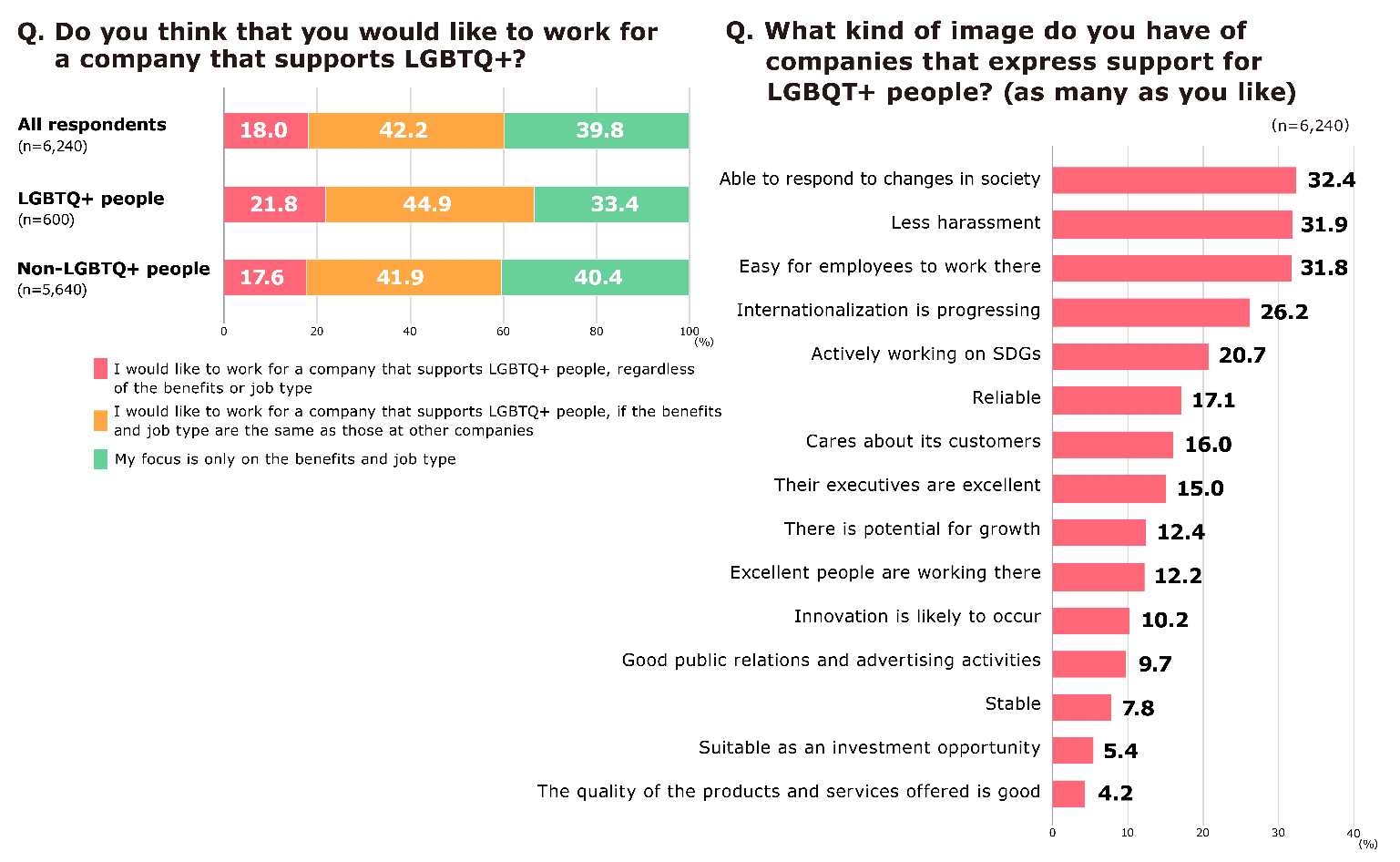
When asked whether they would like to work at a company that supports LGBTQ+ people, 18.0% (21.8% of LGBTQ+ people, 17.6% of non-LGBTQ+ people) answered, “I would like to work for a company that supports LGBTQ+ people, regardless of the benefits or job type,” while 42.2% (44.9% of LGBTQ+ people, 41.9% of non-LGBTQ+ people) said they would like to work there if the benefits and job type were the same as those at other companies. Overall, approximately 60% of respondents expressed their intention to work for an LGBTQ+-friendly company. Although the percentage of LGBTQ+ people is slightly higher, there is no major difference from non-LGBTQ+ people.
When asked about their impression of companies that express support for LGBTQ+ people, the top responses were “able to respond to changes in society,” “less harassment,” and “easy for employees to work there.” This suggests that not only LGBTQ+ people but also non-LGBTQ+ people have a positive image of such companies.
5. Approximately 70% of parents of LGBTQ+ children say they want to support their child’s life to the fullest, while approximately 60% agreed that “It is difficult for families with sexual minorities to live in the area where I live.”

Among the respondents, 67.4% of parents of sexual minorities such as LGBTQ+ individuals agreed that “Although there may be difficulties as a sexual minority, I want to support my child’s life to the fullest,” including those who answered “Agree” or “Somewhat agree.”
In addition, 56.5% of respondents agreed that “It is difficult for families with sexual minorities to live in the area where I live,” indicating that parents of LGBTQ+ children feel inconvenienced and face challenges living in these areas.
6. Respondents living in municipalities with a partnership system agreed that the area where they live is a comfortable place to live. However, approximately 70% of respondents said they did not know about the system even if it existed
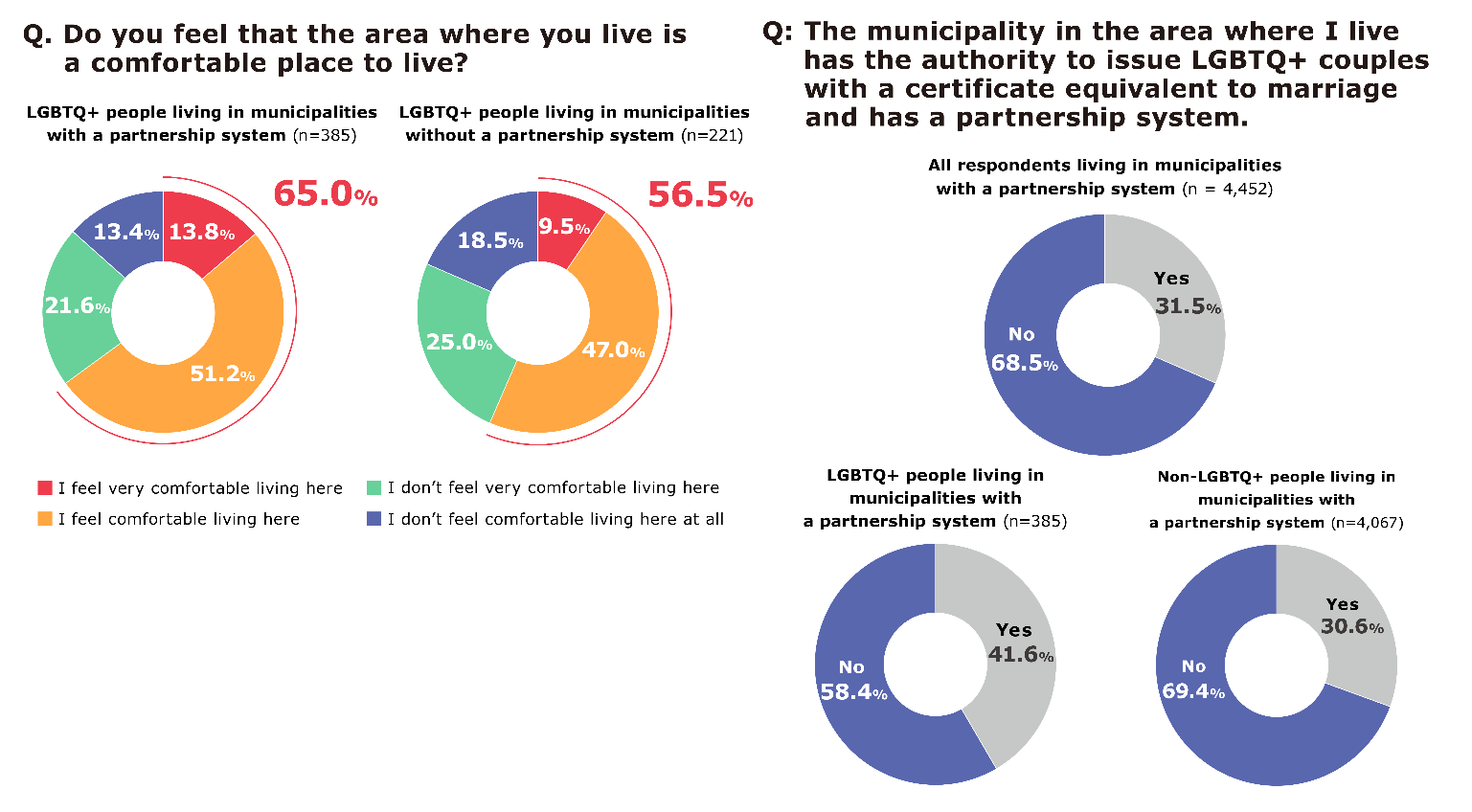
When asked about whether they feel the area they live in is a comfortable place to live, respondents who live in municipalities with a “partnership system,” where municipalities issue certificates for sexual minority couples to establish a relationship equivalent to marriage feel it is more comfortable to live there than those who live in municipalities without such a system.
On the other hand, awareness of the partnership system is still low, with 68.5% of respondents living in municipalities with a partnership system (58.4% of LGBTQ+ people, 69.4% of non- LGBTQ+ people) unaware of its existence. Of course, it should be taken into account that only a short period of time has elapsed since the introduction of the system in many of the municipalities, but since they are expected to promote understanding among their residents and businesses, it is desirable to make the system more widely known.
7. There are differences in how people seek out information depending on their attitudes towards support for LGBTQ+ people
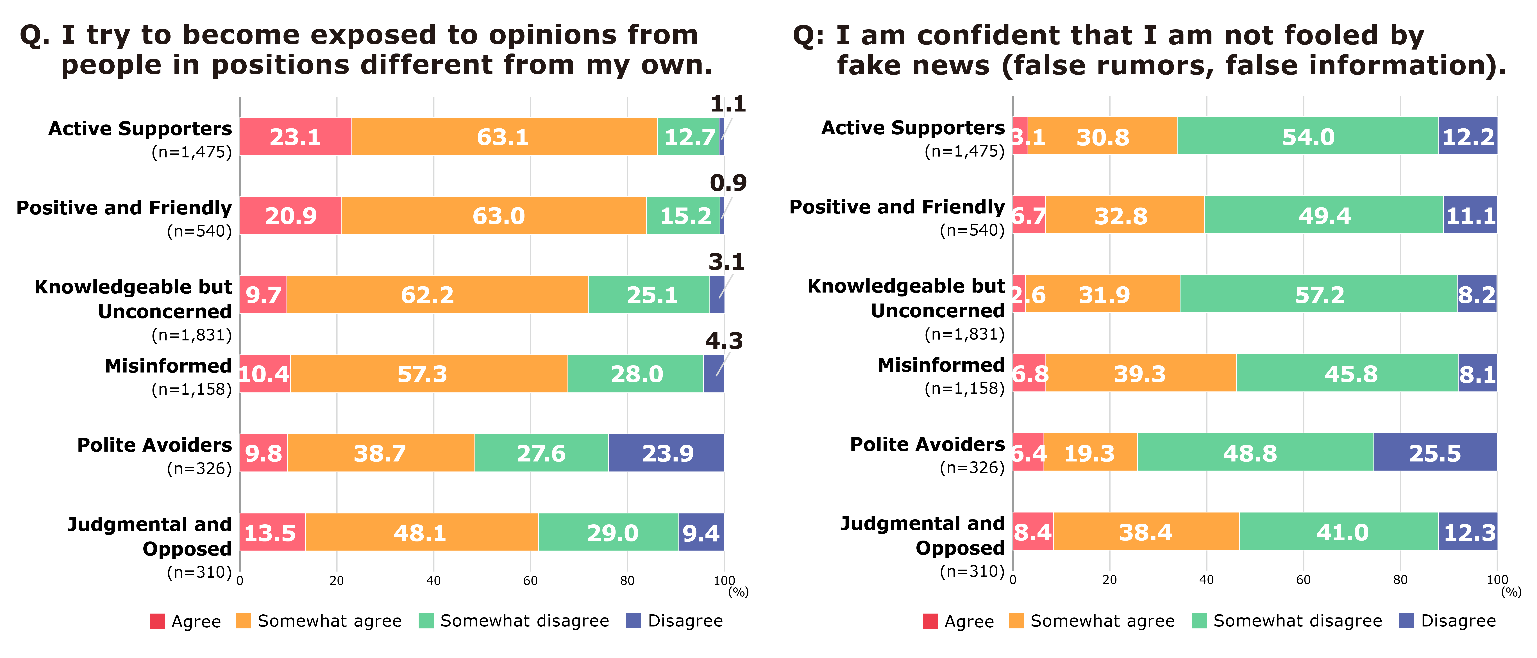
In recent years, the spread of statements based on misunderstandings about LGBTQ+ has become a problem, especially on social media. In response to this situation, cluster analysis*2 of non-LGBTQ+ people (see the 2020 LGBTQ+ Survey press release) was used to confirm whether there are differences in how each cluster seeks out information.
As a result, it was found that about 80% of people who are consciously supporting LGBTQ+ people, such as the Active Supporters and Positive and Friendly cluster, try to become exposed to opinions from people in positions different from their own.
On the other hand, those who have a poor understanding of and are critical towards LGBTQ+ people, such as the Misinformed and the Judgmental and Opposed cluster, have a higher percentage of people who feel confident they will not be fooled by fake news. There were differences in the way each cluster seeks out information.
*2 Several tens of questions asking 5,640 non-LGBTQ+ people aged 20–59 about their awareness and knowledge of LGBTQ+ were prepared. The responses obtained were analyzed based on five factors: awareness of issues, acceptance, feelings of repulsion, worry over social impact, and related knowledge, and were divided into six clusters (Active Supporters, Positive and Friendly, Knowledgeable but Unconcerned, Misinformed, Polite Avoiders, and Judgmental/Opposed).
Dentsu LGBTQ+ Survey 2023 overview
Research organization: dJ Sustainability Development Office
Research cooperation: Dentsu Diversity Lab
Pre-screening survey overview
Targets: 57,500 people aged 20–59
Target area: Nationwide
Duration: Wednesday, June 14–Monday, June 19
Method: Online survey
LGBTQ+ Survey 2023 overview
Targets: 6,240 people aged 20–59
(LGBTQ+ segment: 600 people, non-LGBTQ+ segment: 5,640 people)
Target area: Nationwide
Duration: Wednesday, June 14–Monday, June 19
Method: Online survey
Note: The survey sample was weighted with the country's population composition with respect to prefectures, gender, and age groups (20–39 and 40–59) to calculate the proportion of people in Japan who identify as LGBTQ+.
#####
Contacts:
Survey inquiries:
dJ Sustainability Development Office
dentsu Japan
E-mail: sustainability@dentsu-group.com
Media inquiries:
Group Corporate Communications Office
Dentsu Group Inc.
Email:group-cc@dentsu-group.com

